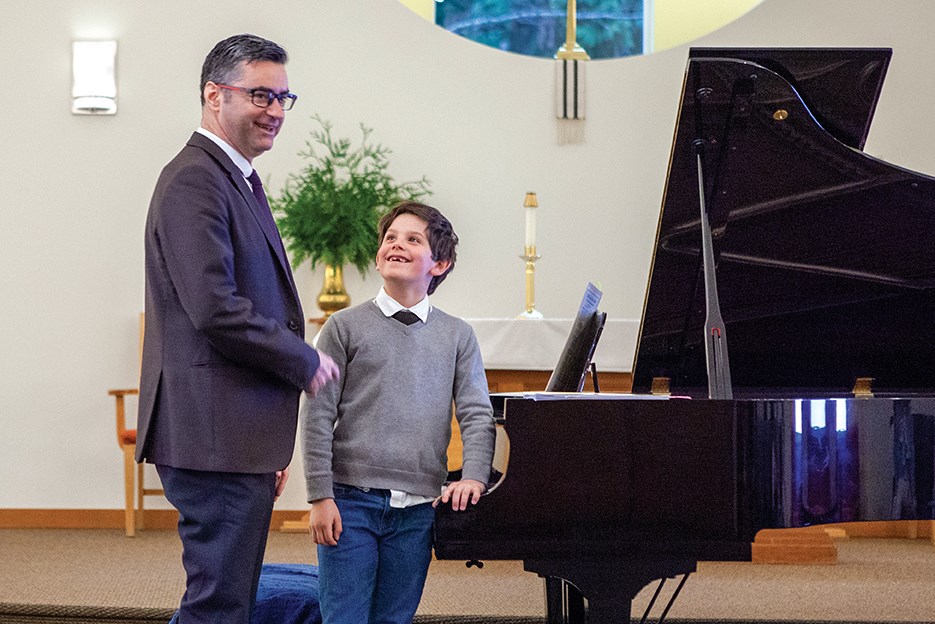The 48th annual Sunshine Coast Festival of the Performing Arts launched its five-week exhibition of live artistry on Monday, April 11, with two days dedicated to piano mastery.
The series of concerts and expert evaluations marks a resumption of in-person performances. The 2020 festival was canceled and the 2021 event was switched to an online-only setting as a result of COVID-19 restrictions. This year’s participant count has dipped slightly below pre-pandemic levels.
“I think maybe now it’s just going to be rebuilding, slowly but surely, as people get more comfortable,” said Sarah Lowis, president of the Sunshine Coast Festival of the Performing Arts Society. The organization was founded in 1973, making it the longest-running festival event on the Coast.
“When registration was open, we still didn’t know what April would look like,” said Lowis. “We were planning on in-person and then got ready to pivot again if we had to.”
Scheduled performances are open to the public, and are broadcast via the festival’s website by volunteer Dan Tsuji. The festival’s piano discipline coordinator, David Poon, facilitated 12 keyboard sessions for pianists under the age of 23, in addition to family duo performances featuring Katherine Hume with her children Allegra and Leif.
The two days of piano performances at St. Hilda’s Anglican Church in Sechelt were adjudicated by Dr. Greg Caisley, a graduate of the University of Southern California and current director of music at St. Paul’s Anglican Church in Vancouver.
Following each category of pieces played by the young pianists, Caisley assembled the musicians in a front pew for group instruction. He emphasized techniques to calm nervous jitters and boost showmanship. Then, before an audience of parents, instructors, and other spectators, he provided individual feedback to each performer.
Caisley established light-hearted rapport with every player. “Look at the marking on this piece,” he said to Joveal Alilin, a competitor in the 11-to-13 age category who performed Crazy Comics by Canadian composer Christine Donkin. “It says with pizzazz. What’s pizzazz? It’s not fast, it’s cool.”
Sitting at the keyboard, Caisley played passages of the competitors’ pieces by sight, demonstrating alternative interpretations. “Seem reasonable? Am I being fair?” he asked Sophie Trinh and Benjamin Beckingham, who competed in the under-11 and 11-to-13 levels respectively. At the conclusion of his crisp instruction he raised his palms for a high five.
“These are the things I missed most during online music lessons,” Caisley exclaimed. “No high fives!”
Complementing the traditional categories of baroque, classical, and compositions by Canadians (or performers themselves, as in the case of Taho Shinagawa who played his original work Misty Mountain), this year the festival board introduced a new prize: the Black, Indigenous, and People of Colour (BIPOC) Composer and Author Award.
“We were in our strategic planning session trying to make sure we were being inclusive, and encouraging people,” said Lowis. “The discipline coordinators made an effort to select adjudicators with that in mind. And the new award is for performers who play any piece by someone with BIPOC heritage.”
As well as ongoing competition performances, two public workshops are scheduled: a fiddle workshop on April 21 and a speech and dramatic arts workshop on April 29, each led by the respective discipline adjudicators.
A house concert featuring fiddle adjudicator Wesley Hardisty, a virtuoso instrumentalist of the Dene First Nation, will take place on April 22 before the festival culminates in a highlights concert on May 7.
“We’re trying to leverage as much as we can, taking this opportunity to share the expertise of who we’re bringing in,” said Lowis. “I just wish more of the public would come and be part of the audience.”
Competitors in the disciplines of bowed strings and folk instrumental will perform at St. Hilda’s Anglican Church from April 19 to 21. A detailed schedule and workshop particulars are available online at www.coastfestival.com.



